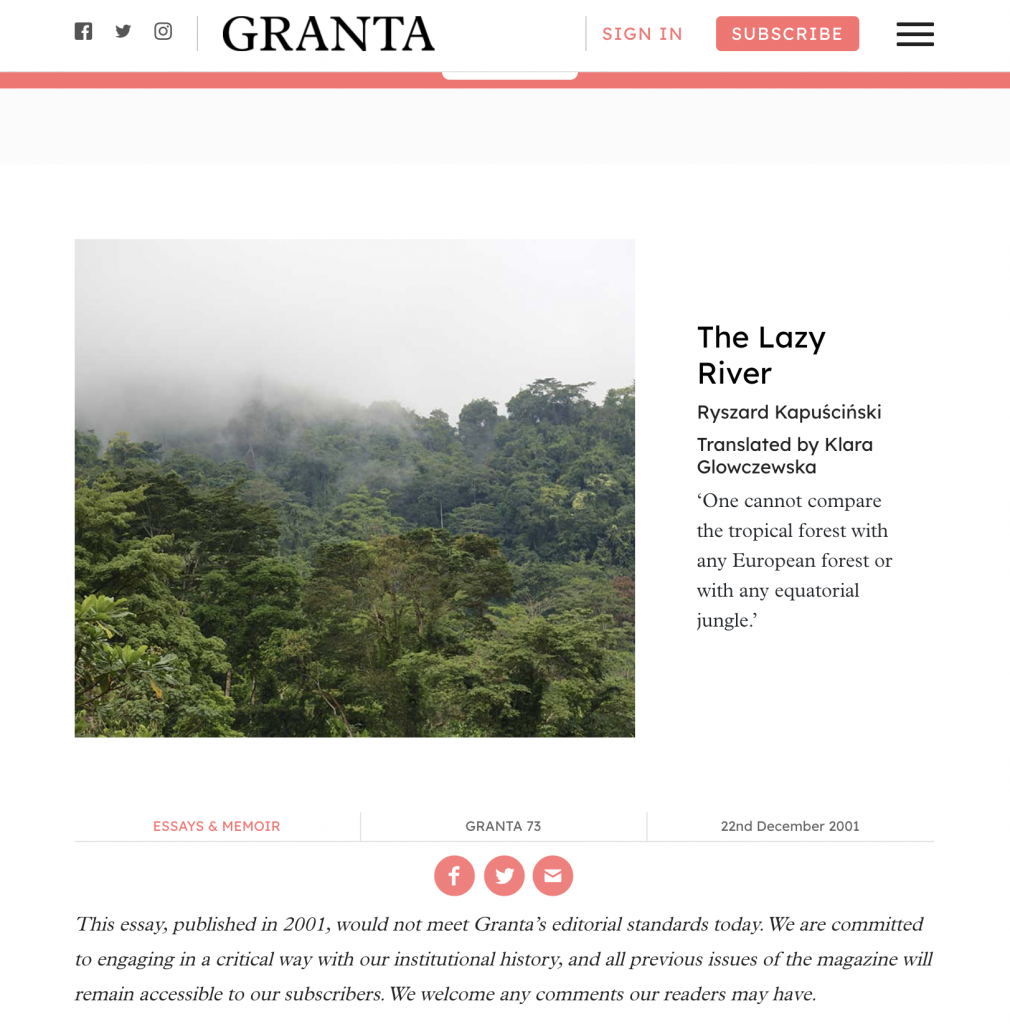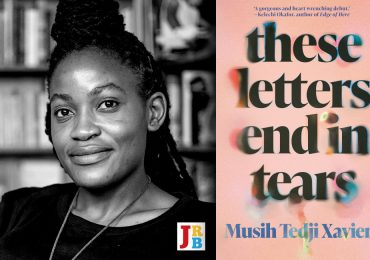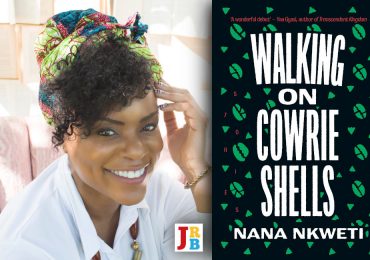I cannot count the number of times I’ve read the late Binyavanga Wainaina’s viral Granta essay, ‘How to write about Africa’. I have taught it in my College Writing Ⅰ class and even read it aloud to my father from my laptop, years ago. I vividly remember the look of awe on his face, though I cannot remember exactly what he said about the piece’s staggering genius or Binya’s ability to satirise, very succinctly, the way the West ‘writes about Africa’. Binya, however, is not the subject of this piece. Wait a minute, Binya is actually the subject of this piece. Okay, I know that doesn’t quite make sense, so let me rephrase that—Binya is the hook of this piece.
This story starts on Twitter.
After George Floyd’s murder by the Minneapolis police in May 2020, a Kenyan writer friend of mine sent me a DM. It was a short message, ending with a link to an essay on Granta entitled ‘The Lazy River’ by the Polish writer Ryszard Kapuściński. The essay is set in the East Region of Cameroon, my home country, and my friend wanted to know what I thought of it. I still recall the way my heart fumed, anger swelling in me, as I sat stunned at my laptop after reading that lazy essay. I typed up my thoughts about ‘The Lazy River’ and sent them to my friend. He agreed with me. In fact, he said, the email was so compelling he wished Granta could hear what I had just told him.
I thought about it, decided he was right, and started crafting another missive, my angry rant becoming the draft. Then, I realised someone else had already done what I wanted to do: Binya. An idea hit me and I googled his famous essay once again. There, the flesh of my email lay right before me. So I reworked the skeletal draft à la Binya, and emailed it to Granta’s editorial desk. My passion for the subject made me write in haste though, without first checking certain facts, and I have provided fact-checking annotations in {curly brackets}, while other edits to my original emails, for purposes of clarity and length, are indicated by [square brackets].
My email:
Hello to whomever is concerned. I am a Cameroonian writer and frequent reader of Granta’s fiction and creative non-fiction. I love the work you do, immensely. However, I have a complaint about the Granta essay titled ‘The Lazy River’ by the Polish journalist Ryszard Kapuściński. I would like to say that the essay irritated and annoyed me greatly for these reasons below.
I’ll start by highlighting this excerpt from the essay:
Stanislaw stops the car, leans his head out of the window, and says: ‘Eveche Bertoua!’ (the bishopric of Bertoua!) This has an instantaneous and magical effect. Anything to do with religion—with the supernatural, with the world of ceremony and spirits, with that which one cannot see or touch but which exists, and exists more profoundly than anything in the material world—is treated with great seriousness here, and immediately elicits reverence, respect and a little bit of fear. Everyone knows how toying with something higher and mysterious, powerful and incomprehensible, ends: it ends badly, always.
First and foremost, that claim (and even generalisation) is wrong. There are shades of grey to the eliciting reverence claim. The Cameroonian government and Cameroonians themselves don’t yield to religious authority as much as he suggests. Our government even has a dark history of killing Bishops and priests over the years, since the seventies. Bishop Ndongmo was condemned to death by our first president, Ahmadou Ahidjo, and the decision was only ‘overturned’ by {Pope Paul Ⅵ, who strongly condemned Ahidjo’s decision, encapsulated by his now famous quote}, ‘Kill Ndongmo but don’t kill my bishop.’ Bishop Balla was found dead in a river under very mysterious circumstances a few years ago—all the other Cameroonian bishops who investigated the matter were unanimous in their conclusion that their colleague was assassinated. Also, ever since the Anglophone crisis started, {a Cameroonian priest named Fr Sob, a Kenyan priest and a Cameroonian seminarian} have been killed in the Anglophone region […]. Furthermore, Cameroonians generally hold priests in high regard and respect them a lot, yes, but even then, a few priests who have been killed were alleged to have been murdered by some of their parishioners. Countless priests in Cameroon have been robbed and the church property they control vandalised.
Secondly, Kapuściński already had a preconceived notion about what Africa is, what Cameroon is, and wrote along the tangent of his skewed view, without taking time to be intellectually curious at all, even while he was visiting. It seems he was more interested in accurately ticking his ‘Africa performance’ items on his malicious checklist—what Helon Habila calls ‘Performing Africa’. Yes, all the things the late, great Binyavanga Wainaina highlighted in his fine essay, ‘How to Write About Africa’, which I’ll contrast below. Now, here is Mr Kapuściński speaking aloud to himself: ‘I have to force through a corruption mention in my essay, even when there isn’t supposed to be any corruption.’
His essay:
They don’t check our documents, do not inspect the car, do not demand a bribe …
Or, as Binya put it: ‘The Modern African is a fat man who steals …’
Here is [my rendition of] Kapuściński talking aloud to himself: ‘There has to be lots of big, black, dark bushes everywhere in my Africa, never mind that there are towns like Yaoundé in Cameroon, Luanda, Abuja, Cairo, Cape Town and posh neighbourhoods like Banana Island in Lagos.’
His essay:
In Africa, if you leave the few main roads, you are lost. There are no guideposts, signs, markings. There are no detailed maps …
Again, as Binya put it: ‘In your text, treat Africa as if it were one country. It is hot and dusty … The continent is full of deserts, jungles, highlands, savannahs and many other things, but your reader doesn’t care about all that.’
And yet another Kapuściński checklist item being ticked off as he speaks to himself here again: ‘Em, let me see. There has to be a nameless primitive tour guide without a history in this my essay hein.’
His essay:
In this way the native, that unprepossessing, barefoot expert on the writing of the landscape, the fluent reader of its inscrutable hieroglyphics, becomes your guide and your saviour.
Or as great Binya put it again: ‘Your African characters may include naked warriors, loyal servants, diviners and seers, ancient wise men living in hermitic splendour. Or corrupt politicians, inept polygamous travel-guides …’
I could go on and on with that checklist, with maybe even eight more checklist items, but I’ll end it there for the sake of brevity. Now, regarding the characters in his essay, the only human beings with names, life histories and personal stories are the Dominican missionary he travels with and the white priest he meets in that village, period. The rest of the people—Cameroonians—are just shadows and blurry animate objects. Also, I wonder how he ignored writing about an urban town like Yaoundé where he first landed, skipping it entirely, and chose to denigrate villages in and around Bertoua like he did. Those were very beautiful floral descriptions of the landscapes no doubt, but the way he wrote about the people in those villages was just disgusting. They are all nameless and dirty and perennially suffering as they toil, lurking behind the essay’s fabric like shadows, like objects, instead of human beings. The Cameroonians there are just dark drapes lining the walls of Kapuściński’s malicious essay.
Kapuściński doesn’t inject any nuance in his piece and wrote a skewed observation of the place without taking time to try and understand the people and their culture one bit. It is not like some of the things he wrote are not true. Many are. But having read other pieces set in Bertoua by other journalists in other magazines, this was by far the most malicious and really perpetuates all sorts of negative stereotypes about Cameroonians, Africans and Africa in general, [to the point] that I wonder how Granta published it. Please can I encourage you to do something about it or, better still, perhaps take it down? The author was greatly exaggerating and exotifying the experiences of his Cameroonian characters, treating them as decoration for his story. In a time when there’s such racial tension in the US and many European countries, creative nonfiction about a place in an African country should employ language which is not ill-intentioned, which should paint Cameroon in a balanced and nuanced way, as it is, for its people, and not [for] a racist, colonial fantasist’s [whim].
I attended an international panel at the [Association of Writers & Writing Programs] conference in San Antonio in March this year, where Lola Shoneyin participated. One of the three panellists was Alex Dehgan, author of The Snow Leopard Project: And Other Adventures in Warzone Conservation. Dehgan, an American in Afghanistan […] spoke so eloquently and in a very informed manner about the heroic effort to preserve Afghanistan’s wildlife and culture […] I must admit, I was so moved by the end of that panel. I learnt so much about Afghanistan beyond the scanty media narrative of ‘mountain enclave for terrorists’, that I’ve now put Dehgan’s book on my to-read list and am very interested in Afghani literature. I felt exactly the opposite after reading Kapuściński’s essay in Granta. I don’t intend to read any of his works any further anywhere.
Kind regards,
Nkiacha
I wish I could publish the reply Granta’s editors sent back, but Granta informed me later, when I told them that I intended to publish our correspondence about the essay, that one of their principles is that all their letters remain private. That means I can only paraphrase as best as I can. (Note they did not object to my publishing my own letters.)
In short, they thanked me for my thoughts on the piece and agreed that the essay, which they pointed out was published two decades ago (2001), had many problems and would not meet their editorial standards today. They applauded the series of points I had made. They concluded by saying that they appreciated the fact that I had taken the time to write to them.
Just that!
Of course, I was pissed off, so I sent a follow up email to them:
Hello there again, thanks for your reply and agreeing that the piece has many problems and stating that it would not meet your editorial standards today. Yes, I know that it was published two decades ago—I did see ‘2001’ on the published piece. I’m aware that the editors now were not the others then. I know too that Kapuściński was well celebrated in his day, but the world has changed. My email, while it raises valid concerns about his essay, also suggests taking action to right that wrong, [as] a way forward. I don’t think it is enough to just admit the flawed editorial standards of 2001 and leave it there as an excuse […], without saying something along the lines of [the] reparation that Granta intends to [make]. [Any such] reparation would be part of the progress and attempts that the publishing world is making now with respect to writers of colour, their culture, their people—for your reply to me was wittily dismissive in a masked way. It had the subtle tone of ‘Yeah, we’re wrong, but dude, move on.’ I don’t really care if I’m never published by Granta in future, but here’s my take on improvement in ourselves as human beings from another angle.
There can be comprehensive and meaningful dialogue and resolutions taken about not only that essay but perhaps other Granta works that have such problems. My MFA faculty admitted recently that systemic bias exists in the programme’s structure and function. They said they have come up short in the task of inclusion and that everyone must challenge themselves to be the teachers and mentors that they want to be for all their students. Everyone must focus on building a more diverse and inclusive literary community. […] My school has now created listening sessions for students of colour to speak up, sent us blind surveys where everyone can write about microaggressions [and] racist, sexist, hurtful experiences […], created a channel to receive critiques and suggestions for programmatic improvement, planned anti-racism training for everyone […], invited more writers of colour in the visiting writers series and promised to hire more diverse instructors in future.
This can be a chance to do something, [for] current editors [to] correct some of the mistakes of previous editors […]—and most importantly, [to ensure] that Binyavanga’s ideas, philosophy and the great work he has done will continue in our spirits even as he’s no longer with us. Please think about this fact deeply. Binya’s Granta essay will [now] be part of the anti-racism training in my American school that is trying to right its old wrongs, yet when a student from that school who will reread Binya’s essay as part of the anti-racism training points out the racism and skewed perspectives in another Granta essay set in his country, Cameroon, he gets a wittily dismissive reply and hears nothing about reparation. Question please. Is that a memory you want to leave in that Cameroonian? Question please. Is that the direction in which you want to take Binya’s legacy and work?
Warmest,
Nkiacha
Author’s note: My MFA ended up not using Binyavanga’s essay for the training, even though the administrators read and considered it when I sent it to them. They said it was great material no doubt, but the caveat was they felt it was too specific for the African students and exclusive of other writers of colour in the programme. They wanted to use material which would encompass all the writers of colour.
Back to Granta’s reply.
They thanked me for following up on the issue and said it was not their intention to be dismissive. They offered their apologies, if their response to my initial email came across that way. They also said that they considered meaningful dialogue crucial to what they do at Granta and took conversations about inclusivity and representation seriously. They mentioned that like many other creative and educational institutions, they were currently undertaking a full diversity, equity and inclusion review and were researching and discussing measures to combat discrimination in all its many forms. They listed several further actions they were taking, from integrating community readers into their editorial process to looking into unconscious bias training.
They said the list was by no means exhaustive, and they would be happy to hear from me about any further suggestions for action they could take.
So I wrote again. Here is the meat of my reply, which also contained further information about my MFA programme:
Hello once again Granta editorial team, I hope this email finds you well. Thank you for your very open response to my brutally honest email. I accept your apology. The admission of the essay’s flaws without a mention of reparation felt to me like it was coming from a dismissive place, so I was disappointed. It’s good to know that even though its reparation intent wasn’t entirely communicated, the email wasn’t ill intentioned. I’m glad to hear about the meaningful dialogue at Granta and that you are taking further steps to combat bias. However, I didn’t hear anything about ‘The Lazy River’ in the email. Please, I would like to know if there are any plans to take it down? Or any action to right the wrong in that essay?
Warmest,
Nkiacha
Granta’s editors replied once more, thanking me for my reply.
Regarding Ryszard Kapuściński’s ‘The Lazy River’ translated by Klara Glowczewska, they proposed to add this paragraph to the online version of the essay:
‘This essay, published in 2001, would not meet Granta’s editorial standards today. We are committed to engaging in a critical way with our institutional history, and all previous issues of the magazine will remain accessible to our subscribers. We welcome any comments our readers may have.’
They thanked me again for the time I used to engage with them.
That was a step forward, to my mind. To this day, you can find the rider situated as a short but telling preface above Kapuściński’s opening paragraph.

Months later, I thought to publish my correspondence with Granta, as one example of how literary reparations might be advanced in our changing world:
Hello once again Granta editorial team,
I hope this email finds you well. This is a new email to an old email thread we started around August 2020, so perhaps you can reread the thread before reading my email below […]
I can see that Granta took the good step of adding the proposed rider to the web version of the article. I’m glad. I shared my Granta correspondence with two close writer friends who strongly suggested that I should publish it in an online literary magazine, so that the correspondence should be publicly preserved, both for archival purposes and as a means of setting an example—call it a template of persistence—for others who wish to join the cause of literary reparations. The publication of my correspondence will present an important case study to the world on how to move the boulder of literary reparations.
Another friend I shared the correspondence with recently told me that although the correspondence counts as really solid publishing material, there was one caveat. As he put it:
‘I’m always chary of publishing private correspondence without the explicit consent of all the parties involved. Otherwise, one enters certain grey areas best avoided.’
So, I’m writing […] to ask if Granta objects to my publishing the correspondence? Do I have Granta’s explicit consent to publish the correspondence? Please let me know if you have any concerns or ideas before I submit it to any lit mags.
All my best,
Nkiacha
Their editors replied, thanking me for my email. They said it was good to hear that my friends and colleagues found my correspondence with Granta thought-provoking—as did they. As to my request, they said one of Granta’s principles is that all editorial emails and letters remain private. They were sorry to say, therefore, that they were not able to consent to publication of their correspondence.
I tried to convince Granta’s editors as best as I could in my next email and to make sure they clarify that I had copyright to my own emails, which they did. They wished me all the best in writing and publishing this essay. They said they hoped that the teachable moment would be helpful to others, as it had been to them internally. They said they hoped that I considered the matter resolved, as they did.
To which I replied:
Hi again Granta editors,
Good to know about this and thanks for your good wishes. Ha, for me ‘consider the matter resolved’ would have been taking down the Kapuściński essay—that is what I advocated for in the first place. However, the [rider] is a big step in the right direction and I’ll accept that. Hopefully, some other person [will] be inspired by the [publication of our correspondence] (without your [verbatim] emails, yes) to go further. It was great communicating with you.
All my best,
Nkiacha
~~~
- Nkiacha Atemnkeng is a writer and music enthusiast from Cameroon. His work was published in the 2015 Caine Prize anthology Lusaka Punk and Other Stories, the 2019 Short Story Day Africa Hotel Africa anthology, Of Passion and Ink: New Voices from Cameroon by Bakwa Books, as well as The Africa Report, This Is Africa, Brittle Paper and Gyara magazine, among others. He is a Goethe Institut/Sylt residency winner, and is currently enrolled in an MFA at Texas State University. Follow him on Twitter.






Keep the good work Mr Nkiache Atemnkeng. I have had these conversations with some American friends here even black Americans about the caricaturing of Africa by writers and journalists. Some times it even gives me headaches to think about some of the write ups I have read over the years. You truly should not relent in your efforts. Keep the good work!